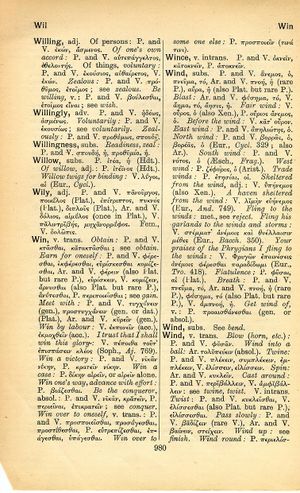wind: Difference between revisions
Τὸ μανθάνειν δ' ἥδιστον εὖ λέγοντος, εἰ κέρδος λέγοι → It is the sweetest thing to learn from one speaking well, if they speak profitably
(nlel) |
m (Woodhouse1 replacement) |
||
| Line 1: | Line 1: | ||
{{Woodhouse1 | {{Woodhouse1 | ||
|Text=[[File:woodhouse_980.jpg|thumb|link={{filepath:woodhouse_980.jpg}}]] | |Text=[[File:woodhouse_980.jpg|thumb|link={{filepath:woodhouse_980.jpg}}]] | ||
===substantive=== | |||
P. and V. [[ἄνεμος]], ὁ, [[πνεῦμα]], τό. Ar. and V. [[πνοή]], ἡ (rare P.), [[αὔρα]], ἡ (also | [[prose|P.]] and [[verse|V.]] [[ἄνεμος]], ὁ, [[πνεῦμα]], τό. [[Aristophanes|Ar.]] and [[verse|V.]] [[πνοή]], ἡ (rare [[prose|P.]]), [[αὔρα]], ἡ (also [[Plato]] but rare [[prose|P.]]). | ||
[[blast]]: [[Aristophanes|Ar.]] and [[verse|V.]] [[φύσημα]], τό, [[verse|V.]] [[ἄημα]], τό, [[ἄησις]], ἡ. | |||
[[fair wind]]: [[verse|V.]] [[οὖρος]], ὁ (also [[Xenophon|Xen.]]), [[prose|P.]] [[οὔριος ἄνεμος]], ὁ. | |||
[[before the wind]]: [[verse|V.]] [[κατ' οὖρον]]. | |||
[[east wind]]: [[prose|P.]] and [[verse|V.]] [[ἀπηλιώτης]], ὁ. | |||
[[north wind]]: [[prose|P.]] and [[verse|V.]] [[βορρᾶς]], ὁ, [[βορέας]], ὁ ([[Euripides|Eur.]], ''[[Cyclops]]'' 329; also [[Aristophanes|Ar.]]). | |||
[[south wind]]: [[prose|P.]] and [[verse|V.]] [[νότος]], ὁ ([[Aeschylus|Aesch.]], ''Fragment''). | |||
[[west wind]]: [[prose|P.]] [[ζέφυρος]], ὁ (Aristotle). | |||
[[trade winds]]: [[prose|P.]] [[ἐτησίαι]], οἱ. | |||
[[sheltered from the wind]], adj.: [[verse|V.]] [[ὑπήνεμος]] (also [[Xenophon|Xen.]]). | |||
[[a haven sheltered from the wind]]: [[verse|V.]] [[λιμὴν εὐήνεμος]] ([[Euripides|Eur.]], ''[[Andromache]]'' 749). | |||
[[fling to the winds]]: met., see [[reject]]. | |||
[[fling his garlands to the winds and storms]]: [[verse|V.]] [[στέμματ' ἀνέμοις καὶ θυέλλαισιν μέθες]] ([[Euripides|Eur.]], ''[[Bacchae]]'' 350). | |||
[[your praises of the Phrygians I fling to the winds]]: [[verse|V.]] [[Φρυγῶν ἐπαινέσεις ἀνέμοις φέρεσθαι παραδίδωμι]] ([[Euripides|Eur.]], ''[[Troades]]'' 418). | |||
[[flatulence]]: [[prose|P.]] [[φῦσαι]], αἱ ([[Plato]]). | |||
[[breath]]: [[prose|P.]] and [[verse|V.]] [[πνεῦμα]], τό, [[Aristophanes|Ar.]] and [[verse|V.]] [[πνοή]], ἡ (rare [[prose|P.]]), [[φύσημα]], τό (also [[Plato]] but rare [[prose|P.]]). [[verse|V.]] [[ἀμπνοή]], ἡ. | |||
[[get wind of]], v.: [[prose|P.]] [[προαισθάνεσθαι]] (gen. or absol.). | |||
===substantive=== | |||
See [[bend]]. | See [[bend]]. | ||
===verb transitive=== | |||
[[blow]] ([[horn]], etc.): [[prose|P.]] and [[verse|V.]] [[φυσᾶν]]. | |||
[[wind into a ball]]: [[Aristophanes|Ar.]] [[τολυπεύειν]] (absol.). | |||
[[twine]] [[prose|P.]] and [[verse|V.]] [[πλέκειν]], [[συμπλέκειν]], [[ἐμπλέκειν]], [[verse|V.]] [[ἑλίσσειν]], [[εἱλίσσειν]]. | |||
[[spin]]: [[Aristophanes|Ar.]] and [[verse|V.]] [[κυκλεῖν]]. | |||
[[cast around]]: [[prose|P.]] and [[verse|V.]] [[περιβάλλειν]], [[verse|V.]] [[ἀμφιβάλλειν]]: see [[twine]], [[twist]]. | |||
===verb intransitive=== | |||
[[twist]]: [[prose|P.]] and [[verse|V.]] [[κυκλεῖσθαι]], [[verse|V.]] [[ἑλίσσεσθαι]] (also [[Plato]] but rare [[prose|P.]]), [[εἱλίσσεσθαι]]. | |||
[[pass slowly]]: [[prose|P.]] and [[verse|V.]] [[βαδίζειν]] (rare [[verse|V.]]), [[Aristophanes|Ar.]] and [[verse|V.]] [[βαίνειν]], [[στείχειν]]. | |||
[[wind up]]: see [[finish]]. | |||
[[wind round]]: [[prose|P.]] [[περιελίσσειν]] (τι [[περί]] τι). | |||
[[wind]] ([[oneself]]) [[round]]: [[prose|P.]] [[περιελίσσεσθαι]] ([[περί]], acc. or absol.) ([[Plato]]), [[περιπτύσσεσθαι]] ([[Plato]]) (absol.); see [[surround]], [[embrace]]. | |||
}} | }} | ||
{{nlel | {{nlel | ||
|nleltext=[[πνεῦμα]], [[πνοή]], [[πορδή]] | |nleltext=[[πνεῦμα]], [[πνοή]], [[πορδή]] | ||
}} | }} | ||
Revision as of 08:45, 20 May 2020
English > Greek (Woodhouse)
substantive
P. and V. ἄνεμος, ὁ, πνεῦμα, τό. Ar. and V. πνοή, ἡ (rare P.), αὔρα, ἡ (also Plato but rare P.).
blast: Ar. and V. φύσημα, τό, V. ἄημα, τό, ἄησις, ἡ.
fair wind: V. οὖρος, ὁ (also Xen.), P. οὔριος ἄνεμος, ὁ.
before the wind: V. κατ' οὖρον.
east wind: P. and V. ἀπηλιώτης, ὁ.
north wind: P. and V. βορρᾶς, ὁ, βορέας, ὁ (Eur., Cyclops 329; also Ar.).
south wind: P. and V. νότος, ὁ (Aesch., Fragment).
west wind: P. ζέφυρος, ὁ (Aristotle).
trade winds: P. ἐτησίαι, οἱ.
sheltered from the wind, adj.: V. ὑπήνεμος (also Xen.).
a haven sheltered from the wind: V. λιμὴν εὐήνεμος (Eur., Andromache 749).
fling to the winds: met., see reject.
fling his garlands to the winds and storms: V. στέμματ' ἀνέμοις καὶ θυέλλαισιν μέθες (Eur., Bacchae 350).
your praises of the Phrygians I fling to the winds: V. Φρυγῶν ἐπαινέσεις ἀνέμοις φέρεσθαι παραδίδωμι (Eur., Troades 418).
flatulence: P. φῦσαι, αἱ (Plato).
breath: P. and V. πνεῦμα, τό, Ar. and V. πνοή, ἡ (rare P.), φύσημα, τό (also Plato but rare P.). V. ἀμπνοή, ἡ.
get wind of, v.: P. προαισθάνεσθαι (gen. or absol.).
substantive
See bend.
verb transitive
blow (horn, etc.): P. and V. φυσᾶν.
wind into a ball: Ar. τολυπεύειν (absol.).
twine P. and V. πλέκειν, συμπλέκειν, ἐμπλέκειν, V. ἑλίσσειν, εἱλίσσειν.
cast around: P. and V. περιβάλλειν, V. ἀμφιβάλλειν: see twine, twist.
verb intransitive
twist: P. and V. κυκλεῖσθαι, V. ἑλίσσεσθαι (also Plato but rare P.), εἱλίσσεσθαι.
pass slowly: P. and V. βαδίζειν (rare V.), Ar. and V. βαίνειν, στείχειν.
wind round: P. περιελίσσειν (τι περί τι).
wind (oneself) round: P. περιελίσσεσθαι (περί, acc. or absol.) (Plato), περιπτύσσεσθαι (Plato) (absol.); see surround, embrace.

